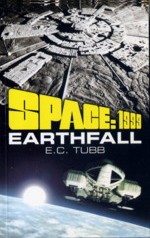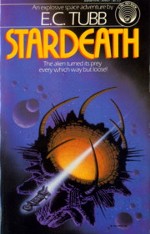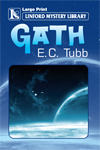| The saga is set in a far
future where mankind has spread across the
universe, populating hundreds of planets so
distant from Earth that its existence has been
forgotten and its whereabouts erased from star
maps. Born on Earth, Earl Dumarest left the
planet as a child, stowing away aboard a visiting
space freighter to escape a savage, primitive
life on a world scarred by ancient wars. After
several decades as an itinerant adventurer,
Dumarest now seeks to return to Earth, searching
for clues that will lead him to the lost
coordinates of his home planet. His quest is
complicated by the machinations of the Cyclan, a
clan of dispassionate scarlet-robed logicians who
act as advisors to those in positions of power
but secretly plot to use their influence with the
ruling classes to place themselves in a position
of absolute power and authority across the
universe. Consistently imaginative, intelligent
and exciting, the Dumarest Saga was a
fast-moving space opera focussed as closely on
character as on plot and almost invariably
indulging all of Tubb’s favourite themes:
beautiful women, hierarchical societies,
gladiatorial combat, logical deduction, the
physical and psychological effects of extended
space travel, and the secret of immortality. Each
volume exhibited the best of Tubb’s writing
skills, the original Brackett pastiche melded
seamlessly with his own author’s
‘voice’ to create what has come to be
regarded as the definitive Tubb style.
|
 |
His second space opera
series, Cap Kennedy, began in 1973
with Galaxy of the Lost and went
on to spawn 16 further novels written at
remarkable speed over the next two years.
|
|
| Commissioned by Donald
Wollheim of DAW Books, the Cap Kennedy
novels were intended as Wollheim’s own rival
to the popular Perry Rhodan and Captain
Future space opera series then being
published by DAW’s competitors. This series
followed the adventures of an intergalactic
investigator, Captain ‘Cap’ Kennedy, a
Free Acting Terran Envoy (FATE) with licence to
act as judge, jury and executioner and the power
to intervene in any situation which threatened
the peace of the Terran Sphere, an interplanetary
federation centred on Earth. Independently
wealthy and operating from his personal
spaceship, the Mordain, Kennedy was
assisted on his missions by engineer Penza
Saratov, scientist Professor Jarl Luden and alien
navigator Veem Chemile, a humanoid chameleon who
claimed to be descended from the Zheltyana, an
ancient race which dominated the galaxy in the
distant past before vanishing without trace.
Such was the
punishing schedule for the Cap Kennedy
books, Tubb had no qualms about plundering his
earlier pulp novels for ideas and plots. Thus The
Tormented City (1953) became Monster of
Metelaze (1973), Debracy’s Drug
(1953) was reworked as Earth Enslaved
(1974), and World at Bay (1954) provided
the basis for A World Aflame (1974).
|
 |
In 1974, British
publisher Futura invited Tubb to
contribute to their novelisations of the
scripts for a lavish new live-action TV
series from Thunderbirds creator
Gerry Anderson. Then still in production,
Space:1999 followed the plight of
the inhabitants of Moonbase Alpha, a
self-contained community located on
Earth’s Moon, after the detonation
of nuclear waste stored beneath the lunar
surface caused a chain reaction which
blasted the satellite out of Earth orbit.
Tubb embraced the project and penned two
books of script adaptations, both of
which transcended the usual expectations
of the TV tie-in. He then went on to
write three original novels – Alien
Seed (1976), Rogue Planet
(1976) and Earthfall (1977) –
with the freedom to develop the
television series format in his own way. |
|
|
| With Earthfall,
Tubb’s enthusiasm for the subject resulted
in an epic novel that was not only one of his
best (and longest) works, but also one of the
best novels ever written from a TV science
fiction property. Rather than simply criticise
the TV series’ bizarre concept for its lack
of scientific plausibility (as Isaac Asimov had
done in the New York Times in 1975), Tubb
took the bull by the horns and found a way to
make it work, producing a grittily realistic
interpretation. 25 years later, he returned to
the series for a final novel, Earthbound
(2003), a free adaption of three further
television scripts set within the narrative
continuity of Earthfall. In the
mid-Seventies, Tubb somehow also found time to
pen three non-SF novels, a series of historical
adventures set in Ancient Rome. Atlius the
Slave (1975), Atilus the Gladiator
(1975) and Gladiator (1978) charted the
rise and fall of a young Briton, Atilus Cindrus,
who becomes a respected lanista during the reign
of Emperor Nero. These were by no means
Tubb’s only non-SF or historical works: in
the mid-1950s he had penned 11 highly-regarded
Western novels, a Foreign Legion adventure, Sands
of Destiny (1955), and a Chandler-esque
detective thriller, Assignment New York
(1955). In the early Sixties, he had also turned
his hand to war stories in scripts for
Fleetway’s various Picture Library
comics.
|
 |
Following the
publication of Stardeath (1985), a
space opera novel intended to be the
first in a new series, Tubb was widely
believed to have retired. In truth,
Tubb’s career had stalled with the
retirement of his long-standing agent Les
Flood and the singular inability of
Flood’s replacement to secure fresh
commissions for the author’s work.
In 1995, Tubb appointed writer and editor
Philip Harbottle as his new literary
agent and his work soon began to appear
in print again with new editions of the
early pulp novels, first editions of
previously unpublished manuscripts, new
collections of short stories, and a new
Dumarest novel, The Return (1997).
|
|
| Buoyed by this revival of
interest from America, Europe and the UK, Tubb
continued writing well into his 90th year. A
final volume in the Dumarest Saga, Child
of Earth (2008) tied up the series’ many
loose ends and brought Dumarest’s quest to a
conclusion, and a new short story, ‘Dead
End’, appeared in the Space: 1999
anthology Shepherd Moon (2010). His final
works were To Dream Again, an expansion of
a 1970s novella, and Fires of Satan, an
entirely new novel – both will now be
published posthumously. Ted Tubb died in
his sleep at his London home on 10 September
2010, aged 90. He married Iris Kathleen Smith in
1944 and is survived by their two daughters,
Jennifer and Linda, two granddaughters and
several great grandchildren.
* * *
|
| Article by Chris Bentley, who was
the editor of the 25th anniversary edition of
Earthfall (2002) and E.C. Tubb’s final
Space:1999 novel Earthbound (2003). He also
contributed the introduction to Child of Earth
(2009), the last Dumarest novel. |
|
 |




